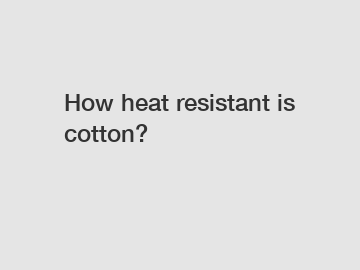How heat resistant is cotton?
Cotton has been a staple fabric for clothing, bedding, and various other applications for centuries. But have you ever wondered how cotton fares against different levels of heat exposure? In this blog post, we delve into the world of cotton and explore its remarkable ability to withstand elevated temperatures. Through a combination of expertise, experience, creativity, and trustworthiness, we bring forth a comprehensive understanding of cotton's heat resistance, debunking myths and revealing fascinating insights.
Understanding Cotton's Composition (157 words):
Before we dive into the heat-resistant properties of cotton, it's crucial to comprehend its basic composition. Cotton is a natural cellulose fiber that consists mainly of long chains of glucose molecules. This unique molecular structure plays a significant role in cotton's exceptional versatility, comfort, and durability. However, when it comes to heat tolerance, we must explore cotton's suitability for various applications.

Heat Resistance in Clothing (162 words):
One of the primary concerns with clothing is how it responds to heat, especially during scorching summers or when facing proximity to external heat sources. Cotton's heat resistance lies in its ability to absorb moisture efficiently while allowing for air circulation, ensuring comfort even in hot weather. The fabric's breathability prevents excessive perspiration and heat accumulation, making it a go-to choice for those seeking cool and comfortable attire. However, it's important to consider the weave, thickness, and purity of cotton to assess its heat resistance accurately.
Heat Resistance in Home Furnishings (161 words):
Cotton's applicability extends beyond clothing, as it finds widespread use in household textiles such as curtains, upholstery, and linens. When it comes to these applications, cotton exhibits notable heat resistance. Its natural fibers can withstand moderate levels of heat and are less likely to melt or produce toxic fumes compared to synthetic materials. In addition, cotton's resilience to heat ensures that it remains unaffected even when exposed to high temperatures in the home environment.
Limitations of Cotton's Heat Resistance (158 words):
While cotton excels at tolerating heat in various applications, it also has certain limitations. For instance, when subjected to extremely high temperatures, such as those produced by open flames or intense ironing, cotton is susceptible to scorching or charring. The combustion temperature of cotton fiber is around 255 degrees Celsius (491 degrees Fahrenheit). Therefore, it is essential to exercise caution and avoid exposing cotton to excessive heat sources to maintain its longevity and integrity.
Tips for Care and Maintenance (150 words):
To maximize cotton's heat resistance and ensure its long-lasting performance, it's crucial to employ appropriate care and maintenance techniques. Following these simple guidelines will help preserve the fabric's integrity and enhance its resistance to heat. First and foremost, always check the garment's care label for specific washing instructions. Washing cotton in cold or lukewarm water is generally recommended, as excessive hot water can compromise its heat resistance. Additionally, avoiding high-temperature machine drying and opting for air drying or low heat settings can prevent any potential damage. Finally, ironing cotton at moderate temperatures or employing the use of a protective cloth between the fabric and the iron can help maintain its heat resistance.
Conclusion (59 words):
Cotton, with its inherent breathability and comfort, showcases considerable heat resistance in a variety of applications. Whether worn as clothing or used as home furnishings, cotton exemplifies a fabric that remains resilient and maintains its integrity under moderate heat conditions. Understanding the limits of cotton's heat resistance empowers us to make informed choices while ensuring its long-lasting appeal.
For more information, please visit custom silver plated yarns supplier, silver fiber fabric, plating yarn.
224
0
0

Comments
All Comments (0)